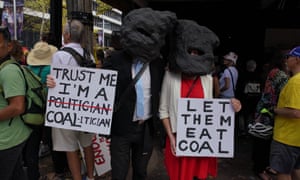Extract from The Guardian
50% of Coalition voters and 67% of Labor voters want to phase out
coal, and majority also support striving to cut greenhouse gas emissions
A majority of Australians would support phasing out coal power by 2030, including half the people in a sample identifying as Coalition voters, according to a survey by a progressive thinktank.
The research funded by the Australia Institute says 60% of a sample of 1,417 Australians surveyed by online market research firm Research Now supported Australia joining the Powering Past Coal Alliance to phase out coal power by 2030.
The Powering Past Coal Alliance – spearheaded by the UK and Canada – was unveiled at the COP23 climate talks in Bonn. The agreement is not legally binding, and the membership does not include Australia or other major coal exporters and users.
The survey suggests there is a core level of support across Australia’s partisan divide for signing on, with 50% of Coalition voters supportive as well as 67% of ALP voters. The significant dissenters were One Nation voters, with only 36% supportive.
A majority of Australians also supported increasing ambition on cutting greenhouse gas emissions, with 58% support, including 47% of Coalition voters in the sample.
“The strong majority support for phasing out coal power shows how far the community is ahead of the government on climate change,” said the Australia Institute’s deputy director, Ebony Bennett.
She said the Turnbull government’s approach on climate and energy policy meant Australia was at risk of missing out on jobs and investment associated with a global boom in renewable energy, and was out of step with public sentiment.
The research follows a declaration on Wednesday at the National Press Club by the resources minister Matt Canavan that he was not interested in contemplating a discussion about a just transition for workers displaced by any phase out of coal consistent with Australia’s international climate obligations.
Canavan said workers suffered when industries shut down or were phased out so euphemisms like “just transitions” were best avoided. “I don’t like the term transition, let’s be frank, if you want to shutdown the coal industry, say it – that’s what will happen.”
The resources minister said expanding the coal industry was “not inconsistent with the obligations we’ve got to reduce carbon emissions”.
He said countries were increasing investment in high-efficiency coal plants to reduce greenhouse gas emissions consistent with the Paris accord. Canavan did not mention that some countries, such as Japan, are increasing investment in high-efficiency coal because of a phase-out of nuclear power.
Canavan also declared in response to a question about balancing his portfolio responsibilities to boost the resources sector with his responsibilities to the Queenslanders who elected him that he had been elected to parliament “on a platform that is unashamedly pro-coal”.
While Canavan was elected because he was given a winnable position on the LNP’s Queensland Senate ticket, the resources minister said: “I got elected on the basis I will support the resources sector.”
The research funded by the Australia Institute says 60% of a sample of 1,417 Australians surveyed by online market research firm Research Now supported Australia joining the Powering Past Coal Alliance to phase out coal power by 2030.
The Powering Past Coal Alliance – spearheaded by the UK and Canada – was unveiled at the COP23 climate talks in Bonn. The agreement is not legally binding, and the membership does not include Australia or other major coal exporters and users.
The survey suggests there is a core level of support across Australia’s partisan divide for signing on, with 50% of Coalition voters supportive as well as 67% of ALP voters. The significant dissenters were One Nation voters, with only 36% supportive.
A majority of Australians also supported increasing ambition on cutting greenhouse gas emissions, with 58% support, including 47% of Coalition voters in the sample.
“The strong majority support for phasing out coal power shows how far the community is ahead of the government on climate change,” said the Australia Institute’s deputy director, Ebony Bennett.
She said the Turnbull government’s approach on climate and energy policy meant Australia was at risk of missing out on jobs and investment associated with a global boom in renewable energy, and was out of step with public sentiment.
The research follows a declaration on Wednesday at the National Press Club by the resources minister Matt Canavan that he was not interested in contemplating a discussion about a just transition for workers displaced by any phase out of coal consistent with Australia’s international climate obligations.
Canavan said workers suffered when industries shut down or were phased out so euphemisms like “just transitions” were best avoided. “I don’t like the term transition, let’s be frank, if you want to shutdown the coal industry, say it – that’s what will happen.”
The resources minister said expanding the coal industry was “not inconsistent with the obligations we’ve got to reduce carbon emissions”.
He said countries were increasing investment in high-efficiency coal plants to reduce greenhouse gas emissions consistent with the Paris accord. Canavan did not mention that some countries, such as Japan, are increasing investment in high-efficiency coal because of a phase-out of nuclear power.
Canavan also declared in response to a question about balancing his portfolio responsibilities to boost the resources sector with his responsibilities to the Queenslanders who elected him that he had been elected to parliament “on a platform that is unashamedly pro-coal”.
While Canavan was elected because he was given a winnable position on the LNP’s Queensland Senate ticket, the resources minister said: “I got elected on the basis I will support the resources sector.”

No comments:
Post a Comment